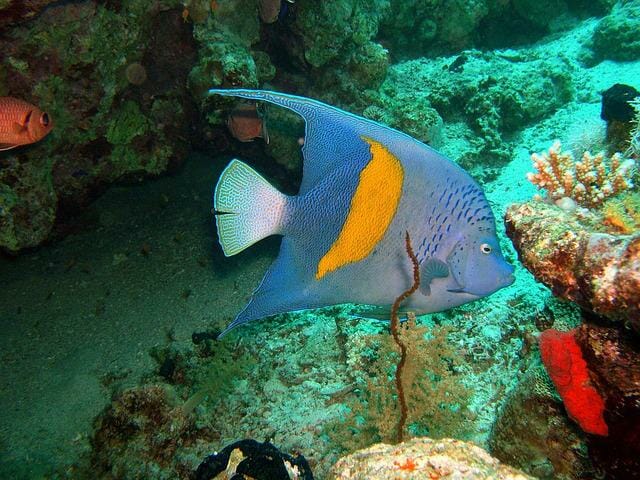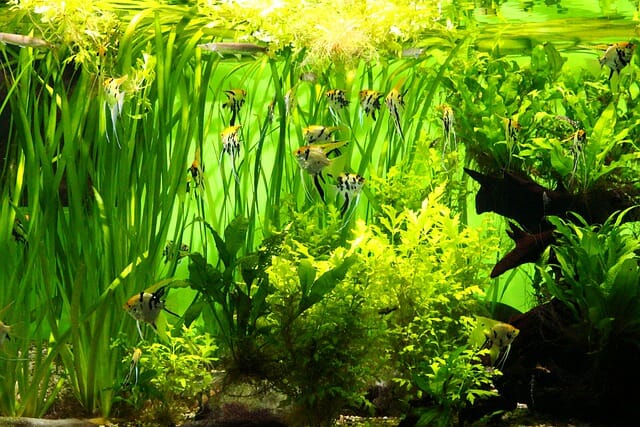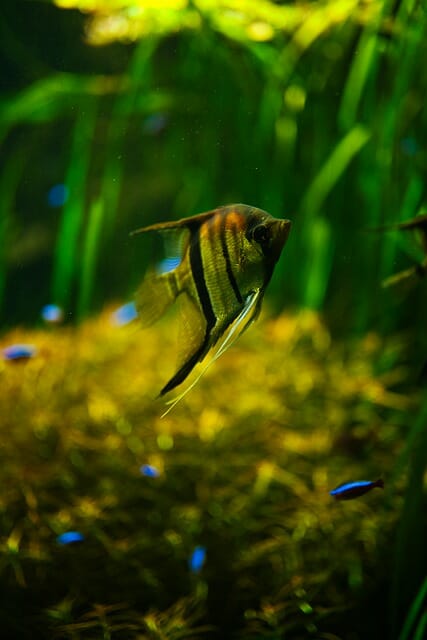Are Angelfish Territorial: Reasons, Signs, and Preventive Measures

They are peaceful fish that provide entertainment and companionship to their owners. However, like any other fish species, angelfish can be territorial. If you own an angelfish and are unfamiliar with their territorial behavior, it’s essential to understand what it means and how to deal with it. In this blog post, we’ll explore territorial behavior and how to prevent it from happening in your tank. We’ll also provide tips on keeping your angelfish healthy and happy.
Table of Contents
Are Angelfish Aggressive?
Territoriality is an instinct that allows an angelfish to protect its territory and resources. Territorial behavior in fish can include aggression towards other fish, including members of the same species, attempts to block access to food or spawning spots, and aggressive posturing.
How Can You Tell if Angelfish Is Aggressive?
It can be hard to tell if your angelfish is aggressive, as its behavior can sometimes seem erratic. However, it might be time to rehome them if you notice them displaying territorial or nipping behavior. Aggressive individuals don’t generally make good aquarium companions and often end up incompatible with other fish in the tank. If this is the case, it might be best to make changes to your tank layout to keep everyone happy.
The symptoms of territoriality in angelfish may include:
- Aggression towards other fish in the tank, including members of the same species
- Attempts to block access to food or spawning spots
- Aggressive posturing
- Restlessness and swimming around erratically
- Changes in behavior, such as becoming more reclusive or refusing to eat
- Pupils that are larger than usual and changing coloration (in some cases, this may be indicative of aggression)
Tips to Prevent Territoriality in Your Tank
When it comes to angelfish, most people think of them as peaceful fish. However, this is not always the case. Angelfish can get territorial and aggressive towards other fish in their tank. To prevent this, you need to understand their natural behavior and set boundaries accordingly.
There are various ways to distract or calm an angelfish, such as feeding them small pieces of food or using a bubbling water feature. Remember to keep an eye on your fish at all times, and if aggression does occur, try to remove the offending fish from the tank as soon as possible.
Provide Adequate Space
If you find that your angelfish is attacking other aquarium fishes, it might be best to rehome them or get a different type of fish. Angelfish are a popular fish and tend to get along well with other fish in the tank, provided they have enough space to swim around. Providing adequate space for your angelfish is also essential as they need enough room to exercise.
Provide Hiding Places
Providing them with hiding places will help keep them calm and relaxed during the breeding season. Angelfish are social fish and need places to hide to feel safe. Provide hiding places for them to feel secure – a fake rock, an empty aquarium, or even a basket.
Reduce the Frequency of Water Changes
Angelfish are a popular aquarium fish and, as such, can get aggressive if they don’t have enough space. Make sure to keep an eye on the aquarium and make sure that there is enough space for all the fish. Additionally, angelfish are tropical fish and, as such, need regular water changes to keep them healthy. You can also try using a water conditioner or adding salt to the water to make it more acidic – these measures will help reduce aggression between angelfish.

Provide Plenty of Food
Ensure you provide them with a varied diet that includes fresh food, and ensure the aquarium is big enough to accommodate their feeding habits. If you notice your angelfish becoming aggressive, it might be time to take them out and rehouse them in a bigger tank.
Remove Breeding Pairs
Angelfish are one of the most popular aquarium fish and can be pretty territorial when breeding. If you have breeding pairs, it is best to remove them before they start fighting. This will help keep your tank peaceful and healthy for the other inhabitants.
Choose Appropriate Tank Mates
Make sure to research the tank mates compatible with angelfish before making a purchase. Some suitable tank mates include java fern, pleco, and dwarf gourami. And if you do buy an angelfish, make sure to add salt, freshwater shrimp, or worms as needed to keep the pH balanced.
Tips to Reduce Angelfish Aggression
Angelfish are beautiful fish that can make great aquarium companions but can be aggressive if they feel threatened. To keep your angelfish happy and healthy, follow these tips:
Use Peaceful Methods
Angelfish can be territorial and aggressive towards other fish in their tank, which can cause a lot of trouble. To reduce aggression levels, use peaceful methods like placing floating objects in the tank. Monitor your fish regularly and change their environment as needed to keep them happy and healthy. If you notice that one of your angelfish is aggressive, there are a few things you can do to try and discourage them. For example, providing them with plenty of food items will help calm them down. Finally, always keep an eye on your fish’s overall health and make changes as needed to keep them comfortable and healthy.
Choose a Compatible Tank Size and Coloration
First, choose an angelfish that is compatible with your tank size and coloration. Second, avoid aggressive types of fish as they may attack your angelfish. Finally, feed your angelfish regularly and give them plenty of space to swim around in their tank. If these measures don’t work, it might be time to consider moving your angelfish to a different tank or aquarium.
Feed Them a Diet of Live Food Only
Feed them a diet of live food only – worms, brine shrimp, etcetera. If you find that your angelfish is getting aggressive, the first thing to do is change your diet. This may include switching over to a water-pictured or aquarium chiller. Keep an eye on the water quality and ensure the food is fresh and high-quality. Finally, be patient – angelfish can take time to adjust to changes in their environment.
Keep the Water Clean and Clear
Keeping the water clean and clear is essential if you want to keep your angelfish happy and healthy. By keeping the water clean, you will avoid aggression from your fish. Additionally, change the water every day or whenever you notice signs of ammonia build-up.
When it comes to angelfish food, always use a good quality formula designed explicitly for angels. Keep an eye on your fish and take appropriate action if they display aggressive behavior.
